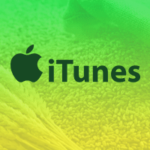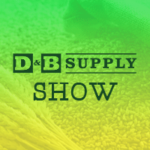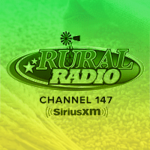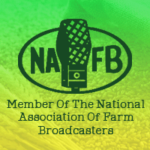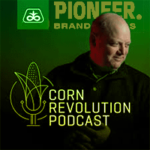Thu, 7 July 2022
On tomorrow's ag business episode I am profiling a company using a new concept of social media to improve farming and share farming methods all over the world. I thought replaying a solo episode I did about how to use Linkedin to grow your business would fit in nicely for our re-cap episode. So, I am replaying episode #678 for you today. Below are the original show notes: Who Am I?I recently published a two part episode about building your own podcasting business on my new show, The Microphone Money Podcast. It dawned on me that is a great skill for everyone following the Off-Farm Income Podcast to know. I have talked about using Craigslist to market your business before. Today, we will talk about LinkedIn. Let me first start by admitting that I am not a LinkedIn expert. But I have used it to build a successful business, and I think it can be valuable for you as well. The only reason I am evening willing to talk about this, is that I have found a strategy with Linkedin that has helped me to build my custom podcasting business, and will help me to attract new business. I know how to use it for this one thing. I'm sure that if I was tested on all of the capabilities of this social media platform I would know about 10% of its actual capabilities. So, please keep that in mind as we go through this episode. Who Are You?I assume that you fall into one of the following three categories when it comes to LinkedIn:
Those of you in categories 1 and 2, I've got great information for you. Those of you in category 3, stick around, I bet I have something for you that you have not thought of. Category #1I want to talk to you category 1 people for a moment and tell you what Linkedin is. LinkedIn is a social media platform that has a business purpose. You may or may not be on Facebook already. Or, you possibly avoid Facebook like the plague because this is not the place for you. We will address why you should not avoid Facebook in a future episode. For now, please think of LinkedIn as very similar to Facebook but for business. On LinkedIn you have "connections" instead of friends. Also, your profile is much more at the forefront of what you do. You can also post text, photos, videos and there is a great article writing function. On a platform like Facebook you connect with friends and family as the primary function, and you share anything you want with them. Connecting with strangers is not something that is the primary function of Facebook unless we are talking about a business page or group. But that is a different topic. Think of Facebook as a wedding or high school reunion. You get to see friends and family that you don't get together with that often any longer. You catch up, talk about the kids, talk about your work and maybe share a thought or two about the state of our country or your favorite baseball team. Contrary to Facebook, connecting with strangers is the main function on LinkedIn, but within a certain set of boundaries - business. Think of LinkedIn as a business conference. You are there with a bunch of people in your industry, and you might all be able to serve each other in different ways. People are open to you coming up to them and asking what they do or even sharing what you do. But there is a decorum and a boundary. We are here to create professional relationships, not life-long friendships. Certainly, aspects of what goes on in Facebook and what goes on in LinkedIn bleed over between the two platforms. But there is a level of expectation of professionalism and focus on business when you are on LinkedIn. If you would not say it or do it at an industry convention, you should not do it on LinkedIn. You want to remain professional and focused on the people you are there for. You don't want to go on a rant about whomever is in the Oval Office at the time (unless that is your business). Treat LinkedIn As LinkedInWith all that said, don't treat LinkedIn as Facebook. As a matter of fact, don't even create an account if you are not clear on how you want to use it. I had a LinkedIn account for years that I mis-used. I don't really know what I was thinking. When I first opened it, I think I thought so highly of myself that I assumed that I would be discovered on LinkedIn and whisked off to my dream job. That did not happen, and I ended up using it incorrectly. I had a lot of connections with my friends on my first LinkedIn account. So, when I tried to connect with someone on LinkedIn, if they looked at my connections they would not see any sort of consistency. They would see bartenders, school teachers, pharmaceutical sales people, farmers, etc., etc. Basically, looking at my site showed that I was not serious or professional. So, don't use LinkedIn for that. Use Facebook for that. On Facebook, everyone expects you to have an eclectic group of friends from all walks of life. And, if you have a crazy aunt who attacks your friends for their views when they are posting on your page, that is just what is expected on Facebook. But remember that Facebook is a wedding, and that crazy aunt is invited. So, your friends know what to expect. LinkedIn is a business conference. Imagine having a conversation at a business conference with someone whom you'd like to work with, and your crazy aunt walks up and attacks them because they are using a plastic straw to drink their iced tea. Not good. Business lost. Tear Down Your Old SiteA little truth here. When I opened my first LinkedIn account it was basically just a second Facebook account for me. I connected with all my friends who were also on LinkedIn, did not post any meaningful content and let it sit idle for years, waiting for the magic to happen. When I started to get serious about my custom podcasting business and I looked at my LinkedIn site, it was embarrassing. I had done everything that I just told you not to do, and I did not want any potential clients to see it. So, I closed it down and started over. Do you need to close yours down? I think that depends on what you have been doing with it. But, if there are a large percentage of people that you are connected to that have no business being at your virtual industry convention, I would say yes. Tear it down! Starting OverLet's draw up some rules for when you start up your new site: Rule #1 - Only request connections with people for legitimate business purposes. If you run across an old high school friend who is in an industry that has nothing to do with your work, don't connect here. Make a note and connect on Facebook. Rule #2 - Turn down requests to connect. Yes, some people are going to be offended by you not connecting on LinkedIn or refusing to connect. You have to weigh this. I have a few people that I have accepted connection requests from on Linkedin that are not in my business circle. Just a few. For the rest I have sent them a note stating that I won't be able to connect with them on my LinkedIn page, but would be more than happy to connect on Facebook. Or, I just ignored this. You will have to weigh which of these responses is most appropriate for you in a given situation. Rule #3 - Don't "set it and forget it". Be active on your page. As you are publishing podcasts, share them here. Write articles that are pertinent to your industry and share them. Keep updating your profile and make sure it is well written, grammatically correct and shows what you want it to show. I currently have 10 articles posted on my LinkedIn profile. These are not just posts. I post on there almost every day when a new episode of one of my shows comes out. The article function allows you to write and post articles much like you would find in an industry specific magazine. These get read by people searching on LinkedIn for your topic. But I believe the greater value is the way these articles position you as an industry expert. Think of it this way. Let's say that your industry of choice is field mowers, and your niche is under tractor mowers. And let's pretend that you have a brick and mortar store called "The Under Tractor Mower Store". If a potential customer came in, was shopping for a new mower and was considering buying one from you they would have questions. You, being the expert would answer their questions, and you would even answer some other questions that they did not know they had. Being able to have this conversation with a potential customer is very valuable because you have the opportunity to show them the value of your product. When you write articles on Linkedin, this is your way having this conversation with your potential customers. And when they look at your profile and see your articles, this is their way of walking into your virtual store. As an example, on my LinkedIn profile I have an article titled "If You Have An Agricultural Message To Share, You Better Have A Podcast". This is not the most eloquent writing, but it is direct and to the point. This article is written for the potential customer that visits my virtual store and has an agricultural message to share. That title is going to catch their eye, and they are going to be intrigued. When they get done reading the article they are going to have their questions answered, even the questions they did not know they had. This positions me as an industry expert, and it works! Rule #4 - Don't send out a lot of connection requests to everyone in your industry on day one. Be strategic about this and have a reason to connect. This platform is not about having the biggest number of connections. It is about having quality connections. As I talked about last week, there is a strategic way to make connection requests that will get you more bang for your buck. More on that in a moment. Rule #5 - Don't include the kitchen sink on your profile. Think of LinkedIn, all of LinkedIn, as a virtual resume. The #1 rule of a resume is that you don't want it to be too long with superfluous information on it. This means that you need to understand who you are targeting with your LinkedIn page and tailor the page to that audience. Let me give you an example. I took one career path in college, then I did a complete 180 degree flip with my career after college, and then I came back to the original career path that I had been on in college after about 15 years. The industry umbrella that my current niche falls under is agriculture. But my career for 15 years was in policing. During my time as a police officer I earned a master's degree in criminal justice. I am proud of this degree, but I do not list it on my LinkedIn profile. In my opinion it will only serve to confuse my potential clients. So, I list my bachelor's degree only, which is in agriculture. This rule applies to your work experience as well. If you look at my profile, all I list are the podcasts or radio shows that I host or contribute to. That is because my target market are companies who are going to need someone to host a show for them. You will want to cater to your target market. Rule #6 - Beware of what you post. I read a great post once, and I cannot remember the name of the author. I wish I could so I could them credit for this. Before you ever hit "submit" or "post" or "send" or whatever command will make your thoughts public you should step away from the keyboard, do something totally unrelated to your post and then come back to your computer. Re-read your post and make sure that it says what you want to say. More importantly, make sure that it does not say anything that would not want to say. Make sure that in the heat of the moment you did not write something that you would later take back if you could. You never know who might read this post. If they are offended by what they see, you may never get a chance to make amends because you might never know they even read it. They might just choose to not do business with you. Rule #7 - Don't just accept connections and go on about your day. Be grateful for the connection, and send a message to your new connection thanking them for connecting. Make yourself stand out and build rapport. And, yes. Some people could care less and they are just trying to get another number, or they are trying to get business by connecting with as many people as possible. You will smell that out soon enough. Developing Your NetworkWhen you start reaching out to people in your industry on LinkedIn you have to understand how they will see you. You must try to see yourself through their eyes. They are not going to see an energetic start up with a great ideas who is willing to take risks and put themselves out there because they are so passionate about this industry. They are going to see another entrepreneur with a business idea who wants to connect with them because they work for a company with big budgets. If your new connection is nice enough to accept your connection request, even though they don't know who you are and don't know anything about your company they are likely just a nice person. Meaning they are accepting it because they would rather do something positive, say "yes", then something negative, say "no". But that is probably as far as it is going. They are not going to look at your profile. If I am right about this, why send the connection request? Once they click "accept" and move on, your chance to get them to spend any more time on you or to look at your profile has just passed you by. If you think there is a benefit to having them show up on your profile as a connection, there probably is not. There are lots of people, with lots of connections on LinkedIn. So, this probably does not mean much to the potential customer who looks at your profile. So, I suggest connecting with people when you can either offer them something, have advice for them or when you want to pitch them an idea. This will up the odds of them actually looking at your profile. At this point you are just planting seeds, and there are a lot of things that are outside of your control. For example, you cannot force them to go through your profile or read your posts. But they might, especially if you have piqued their interest somehow. If they read your articles the chances of them becoming more interested in you or your ideas will go way up. There is another bonus to doing this. It is the message function. For now, if you want to send a message to a non-connection, LinkedIn requires you to be a premium member. This is expensive. But, there is a loophole. If you are requesting that somebody be a connection, you can include a message to them for free, explaining your reason for connecting. This is a great way to be able to contact some high level people and plant a seed. And if they are intrigued by your idea, they are almost guaranteed to look at your profile. They would be derelict in their duty if they pursued something with you, spent their scarcest resource (time) on the idea and never took the time to determine if you were legitimate. So be strategic in how you build your network on Linkedin. If you have your eye on a connection, say the vice-president of marketing for the "Under Tractor Mower Company", do some research. Read about this person online. Find out what he or she said the last time they were interviewed. Did they mention any pain points? If they did, can you do a little leg work for them? Then can you send a message with your connection request stating, "I read that it was a tough decision whether or not to make under tractor mowers or PTO driver mowers. I found some research from Germany saying that solo farmers prefer under tractor mowers more." This is a pretty crazy example, but hopefully you get the point. Even though these people are in the power position you should still find a way to help or give to them rather than just come to them wanting something. They get a lot of that everyday. You want to stand out by being different. Sharing Your Resume This is really similar to building your network. But when you are going to be meeting with someone for real, like at a coffee shop or something like that, it is a great idea to connect on LinkedIn just before that meeting. If they have agreed to meet with you about one specific idea, they would likely want to prep for the meeting before hand. You can simply send them a connection request a few days prior with a message that says, "I thought I'd connect with you here so you could see my profile prior to our meeting in a couple of days. Looking forward to the conversation." You are doing something gracious for them by making it easier for them to prep for the meeting. But you are also being totally transparent and showing them you have nothing to hide. And, even though you are meeting to discuss one specific idea, you probably have many different ideas you would like to pitch them. If they read one of your articles that applies to them, they might see that you offer another service or be intrigued by your expertise enough to ask about it. They will see you as offering more value, and you do not have to overwhelm them with all sorts of ideas on the day you meet. You can be casual, let your profile speak for itself and avoid looking desperate. Get RecommendedLinkedIn has two fabulous features called "Skills & Endorsements" and "Recommendations". This creates unbelievable opportunities for you. What if a person, who is respected in the industry, was willing to either endorse you, your business or write you a recommendation? What if whole world could see it? LinkedIn makes this possible. Whether or not you have already connected or you are requesting a connection, I would follow this request up with a telephone call. And if you cannot get through on the phone I would try a hand written letter requesting a recommendation or endorsement. This is powerful stuff, and you should strike while the iron is hot. And don't be shy about offering to recommend them or even doing it proactively. Just make sure that you have a legitimate experience with them that gives you credibility in the recommendation. If you recommend someone who you have never met, or never interviewed it is likely to look like pandering. Timeless Advice The great news about this advice is that it can change with technology. So, if LinkedIn develops a bunch of new technology by the time that you read this, you can still use this advice. My hope is that LinkedIn stays around for a long time, and that you can benefit from my experience doing this for a long time to come. Best of luck to you with this method. It is a lot of fun! More Places You Can Listen to Off-Farm Income And Matt Brechwald:
Direct download: Off_Farm_Income--Episode_1430-Replay_Of_Episode_678-COMM_15_08-062322.mp3
Category:farming -- posted at: 12:30am MDT |
Off-Farm Income

Categories
generalfarming
FFA
rural crime
vicuna
Agricultural Colleges
Archives
AprilMarch
February
January
December
November
October
September
August
July
June
May
April
March
February
January
December
November
October
September
August
July
June
May
April
March
February
January
December
November
October
September
August
July
June
May
April
March
February
January
December
November
October
September
August
July
June
May
April
March
February
January
December
November
October
September
August
July
June
May
April
March
February
January
December
November
October
September
August
July
June
May
April
March
February
January
December
November
October
September
August
July
June
May
April
March
February
January
December
November
October
September
August
July
June
May
April
March
February
January
December
November
October
September
August
July
June
May
April
March
February
January
December
November
| S | M | T | W | T | F | S |
|---|---|---|---|---|---|---|
| 1 | 2 | |||||
| 3 | 4 | 5 | 6 | 7 | 8 | 9 |
| 10 | 11 | 12 | 13 | 14 | 15 | 16 |
| 17 | 18 | 19 | 20 | 21 | 22 | 23 |
| 24 | 25 | 26 | 27 | 28 | 29 | 30 |
| 31 | ||||||
Syndication



